- Connect with us
-
Apply Now Contact Us 512.380.1003

In 2011, Sol volunteers and local Costa Rican children planted a total of 120 native trees on the Universidad Latina campus in Costa Rica. The trees will provide shade, shelter, and fruit for local wildlife. They will sequester carbon, produce oxygen, and also decrease rainwater run-off for many years to come. As a study abroad program, off-setting our carbon footprint is especially important given the amount of fossil fuels burned during international air travel. The trees we plant today will contribute to a cleaner, greener future tomorrow.

In 2009 Sol Abroad founded the Pura Vida English and Environmental Club in partnership with local public elementary school. Through the club Sol Abroad students volunteer teaching English and Environmental Education to preschool and elementary Costa Rican children. Activities include planting trees together, making recycled art projects, music, and playing group-building games. Sol Abroad also brings the school children on campus for free activities during vacations and for Semana Ambiental--Environmental Week at the Universidad Latina. Perhaps the most important lesson from teaching environmentalism is that we actually have a lot to learn from the children. Costa Ricans in general have a much lower rate of consumption and waste than most US and European citizens!
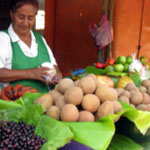
In 2012 Sol students created an organic garden and environmental mural project at a local center for people with disabilities. Sol students take care of the garden year-round, learning about organic and biointensive gardening techniques by preparing beds, planting seeds and seedlings, transplanting, weeding, watering, and harvesting vegetables. The produce is used by the center's staff for the daily meals they offer to people with disabilities. Students also made and donated a worm bin, which transforms food scraps, cardboard, and newspapers into soil and "worm tea" for the garden. The rainforest mural, painted by Sol students, depicts Costa Rica's biodiversity.
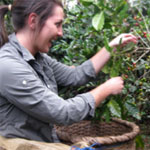
All students are asked to take showers of 10 minutes or less to conserve water and electricity. We have placed reminder signs in each host family home and bathroom. Most Costa Rican homes are equipped with hot-water on-demand electric water heaters, which are more sustainable and use less energy than the hot water tanks typically used in the United States.
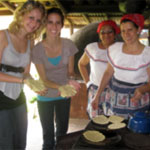
Costa Rica boasts that 93% of its energy is generated by renewable resources—water, geothermal, and wind power. Sol students are asked to turn off lights and appliances when they leave the room, and unplug chargers when not in use. We hope that these habits will be taken back home to the US and shared, where energy sources are not as green as they are in Costa Rica. As they learn about how much energy and water are consumed produce and transport food, students are inspired to be more mindful and less wasteful of resources.
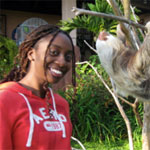
On excursions, Sol Abroad staff collects bottles, cans, and paper to be recycled once we return to Heredia. Sol students are encouraged to use the recycling bins on the Universidad Latina campus. Students are encouraged to carry re-usable water bottles, which can be refilled at the drinking fountains on campus or from the tap at home as an alternative to buying drinks in plastic bottles. For activities involving food we purchase biodegradable plates and forks that are made out of corn or palm fiber. For birthdays we celebrate with frosted cupcakes, eliminating the need to use plastic plates and forks at all. For snacks for volunteering we purchase healthy local fruit (not imported) from the municipal market.
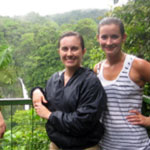
We are very conscious about our ripple effect in the local community and in Costa Rica in general. Our intention is to support small, local businesses and organizations that promote sustainability, human rights, conservation, public health and wildlife protection whenever possible.
In 2009 Sol Abroad partnered with a family-run sustainable farm to develop a unique organic coffee tour for Sol students. Over the years the program has grown and evolved. Sol Abroad is now supporting the farmer Don Danilo in developing a volunteer and tour program that will generate income for his family and allow him to continue farming without chemical fertilizers or pesticides.
In 2006 Sol Abroad partnered with a local Costa Rican woman, Flor, to develop the Traditional Costa Rican Cooking Class for Sol students. Today we are supporting her in developing and promoting the class as a small tourism business to generate income for her family. Given the patriarchal traditions in Latin America, we are especially proud of support woman-owned businesses.
In 2010 Sol Abroad partnered with Children Without Borders for donation drives of supplies for families in need. CWB is a non-profit organization that provides life-saving medical care to children and preventative health education for families in under-served countries. Through this drive Sol Abroad collected donations of toothbrushes, toothpaste, dental floss, toys, crayons, markers, and coloring books for impoverished families in Costa Rica. At the end of each program, students are invited to donate used clothing in good condition and leftover toiletries like shampoo and soap to be distributed to families. In 2011 Sol Abroad students volunteered to lead the first-ever Health Camp for kids. They coordinated a week of activities including nutrition, exercise, vision and blood pressure evaluation, and planted small tire gardens to grow fresh vegetables and fruit with low-income children. Through the Social Programs Office of the Universidad Latina, Sol students also volunteer with annual school supply and toy drives for children in need.
Sol Abroad supports a local private wildlife rescue center, which receives, evaluates, and treats confiscated, sick, and injured wildlife. Animals that cannot be rehabilitated and released into he wild find a loving home on the ranch. The two-acre farm has become a permanent residence for more than one hundred individual birds representing more than twenty species including toucans, parrots, owls, and pheasants. Over the years the center was expanded to take in mammals including three two-toed sloths, a spider monkey, a Mexican spiny porcupine, and a baby kinkajou or honey bear, a small nocturnal arboreal creature. Visiting this facility also educates Sol students about species extinction and the need to protect habitats and ecosystems to sustain the earth's biodiversity.
Sea turtle egg consumption in Costa Rica is a cultural, economic, and social problem with devastating effects on animal populations. If this issue is not solved, some species of sea turtles could become extinct within our lifetime. Sol Abroad staff strives to educate host families about endangered sea turtles and encourage them to find alternatives to eating turtle eggs.
Sol Abroad excursions include visits to both national parks and private reserves, which preserve more than 28% of Costa Rica’s national territory. On these visits Sol Abroad directors impart to students knowledge about each region's rich biodiversity and the urgency and responsibility we have to protect the rainforest. It is estimated that the rainforest is being cut down at a rate of one acre a second across the planet. In Costa Rica, the majority of initial deforestation was driven to a large extent by the demand for beef by US fast food chains. One of the simplest things we can do to save the rainforest is to eat less red meat and fast food. Although deforestation in Costa Rica has slowed due to regulations and conservation efforts, the forest is still being cut down to make room for land to graze cattle, produce agricultural products, and to build hotels and housing developments.
Before the advent of pharmaceuticals, our ancestors turned to plants as medicine. In fact, many modern pharmaceutical medicines come from rainforest plants and animals, or are synthetic versions of them. In Costa Rica, many abuelas or grandmothers preserve traditional knowledge by using teas, ointments, and juices from local plants and fruits to improve their health. Today there is a resurgence of interest in natural healing. Part of our Heredia City tour includes a medicinal plant stand to learn about the beneficial properties of different native plants. One of our cultural activities for semester students is a medicinal plant tour at a local organic herb farm.